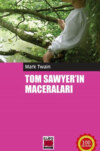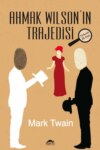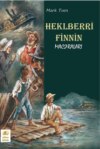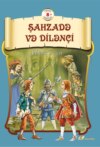Kitabı oku: «Personal Recollections of Joan of Arc — Volume 1», sayfa 2
“Yes, that was it, dear.”
“If a man comes prying into a person’s room at midnight when that person is half-naked, will you be so unjust as to say that that person is showing himself to that man?”
“Well — no.” The good priest looked a little troubled and uneasy when he said it.
“Is a sin a sin, anyway, even if one did not intend to commit it?”
Pere Fronte threw up his hands and cried out:
“Oh, my poor little child, I see all my fault,” and he drew her to his side and put an arm around her and tried to make his peace with her, but her temper was up so high that she could not get it down right away, but buried her head against his breast and broke out crying and said:
“Then the fairies committed no sin, for there was no intention to commit one, they not knowing that any one was by; and because they were little creatures and could not speak for themselves and say the law was against the intention, not against the innocent act, because they had no friend to think that simple thing for them and say it, they have been sent away from their home forever, and it was wrong, wrong to do it!”
The good father hugged her yet closer to his side and said:
“Oh, out of the mouths of babes and sucklings the heedless and unthinking are condemned; would God I could bring the little creatures back, for your sake. And mine, yes, and mine; for I have been unjust. There, there, don’t cry — nobody could be sorrier than your poor old friend — don’t cry, dear.”
“But I can’t stop right away, I’ve got to. And it is no little matter, this thing that you have done. Is being sorry penance enough for such an act?”
Pere Fronte turned away his face, for it would have hurt her to see him laugh, and said:
“Oh, thou remorseless but most just accuser, no, it is not. I will put on sackcloth and ashes; there — are you satisfied?”
Joan’s sobs began to diminish, and she presently looked up at the old man through her tears, and said, in her simple way:
“Yes, that will do — if it will clear you.”
Pere Fronte would have been moved to laugh again, perhaps, if he had not remembered in time that he had made a contract, and not a very agreeable one. It must be fulfilled. So he got up and went to the fireplace, Joan watching him with deep interest, and took a shovelful of cold ashes, and was going to empty them on his old gray head when a better idea came to him, and he said:
“Would you mind helping me, dear?”
“How, father?”
He got down on his knees and bent his head low, and said:
“Take the ashes and put them on my head for me.”
The matter ended there, of course. The victory was with the priest. One can imagine how the idea of such a profanation would strike Joan or any other child in the village. She ran and dropped upon her knees by his side and said:
“Oh, it is dreadful. I didn’t know that that was what one meant by sackcloth and ashes — do please get up, father.”
“But I can’t until I am forgiven. Do you forgive me?”
“I? Oh, you have done nothing to me, father; it is yourself that must forgive yourself for wronging those poor things. Please get up, father, won’t you?”
“But I am worse off now than I was before. I thought I was earning your forgiveness, but if it is my own, I can’t be lenient; it would not become me. Now what can I do? Find me some way out of this with your wise little head.”
The Pere would not stir, for all Joan’s pleadings. She was about to cry again; then she had an idea, and seized the shovel and deluged her own head with the ashes, stammering out through her chokings and suffocations:
“There — now it is done. Oh, please get up, father.”
The old man, both touched and amused, gathered her to his breast and said:
“Oh, you incomparable child! It’s a humble martyrdom, and not of a sort presentable in a picture, but the right and true spirit is in it; that I testify.”
Then he brushed the ashes out of her hair, and helped her scour her face and neck and properly tidy herself up. He was in fine spirits now, and ready for further argument, so he took his seat and drew Joan to his side again, and said:
“Joan, you were used to make wreaths there at the Fairy Tree with the other children; is it not so?”
That was the way he always started out when he was going to corner me up and catch me in something — just that gentle, indifferent way that fools a person so, and leads him into the trap, he never noticing which way he is traveling until he is in and the door shut on him. He enjoyed that. I knew he was going to drop corn along in front of Joan now. Joan answered:
“Yes, father.”
“Did you hang them on the tree?”
“No, father.”
“Didn’t hang them there?”
“No.”
“Why didn’t you?”
“I — well, I didn’t wish to.”
“Didn’t wish to?”
“No, father.”
“What did you do with them?”
“I hung them in the church.”
“Why didn’t you want to hang them in the tree?”
“Because it was said that the fairies were of kin to the Fiend, and that it was sinful to show them honor.”
“Did you believe it was wrong to honor them so?”
“Yes. I thought it must be wrong.”
“Then if it was wrong to honor them in that way, and if they were of kin to the Fiend, they could be dangerous company for you and the other children, couldn’t they?”
“I suppose so — yes, I think so.”
He studied a minute, and I judged he was going to spring his trap, and he did. He said:
“Then the matter stands like this. They were banned creatures, of fearful origin; they could be dangerous company for the children. Now give me a rational reason, dear, if you can think of any, why you call it a wrong to drive them into banishment, and why you would have saved them from it. In a word, what loss have you suffered by it?”
How stupid of him to go and throw his case away like that! I could have boxed his ears for vexation if he had been a boy. He was going along all right until he ruined everything by winding up in that foolish and fatal way. What had she lost by it! Was he never going to find out what kind of a child Joan of Arc was? Was he never going to learn that things which merely concerned her own gain or loss she cared nothing about? Could he never get the simple fact into his head that the sure way and the only way to rouse her up and set her on fire was to show her where some other person was going to suffer wrong or hurt or loss? Why, he had gone and set a trap for himself — that was all he had accomplished.
The minute those words were out of his mouth her temper was up, the indignant tears rose in her eyes, and she burst out on him with an energy and passion which astonished him, but didn’t astonish me, for I knew he had fired a mine when he touched off his ill-chosen climax.
“Oh, father, how can you talk like that? Who owns France?”
“God and the King.”
“Not Satan?”
“Satan, my child? This is the footstool of the Most High — Satan owns no handful of its soil.”
“Then who gave those poor creatures their home? God. Who protected them in it all those centuries? God. Who allowed them to dance and play there all those centuries and found no fault with it? God. Who disapproved of God’s approval and put a threat upon them? A man. Who caught them again in harmless sports that God allowed and a man forbade, and carried out that threat, and drove the poor things away from the home the good God gave them in His mercy and His pity, and sent down His rain and dew and sunshine upon it five hundred years in token of His peace? It was their home — theirs, by the grace of God and His good heart, and no man had a right to rob them of it. And they were the gentlest, truest friends that children ever had, and did them sweet and loving service all these five long centuries, and never any hurt or harm; and the children loved them, and now they mourn for them, and there is no healing for their grief. And what had the children done that they should suffer this cruel stroke? The poor fairies could have been dangerous company for the children? Yes, but never had been; and could is no argument. Kinsmen of the Fiend? What of it? Kinsmen of the Fiend have rights, and these had; and children have rights, and these had; and if I had been there I would have spoken — I would have begged for the children and the fiends, and stayed your hand and saved them all. But now — oh, now, all is lost; everything is lost, and there is no help more!”
Then she finished with a blast at that idea that fairy kinsmen of the Fiend ought to be shunned and denied human sympathy and friendship because salvation was barred against them. She said that for that very reason people ought to pity them, and do every humane and loving thing they could to make them forget the hard fate that had been put upon them by accident of birth and no fault of their own. “Poor little creatures!” she said. “What can a person’s heart be made of that can pity a Christian’s child and yet can’t pity a devil’s child, that a thousand times more needs it!”
She had torn loose from Pere Fronte, and was crying, with her knuckles in her eyes, and stamping her small feet in a fury; and now she burst out of the place and was gone before we could gather our senses together out of this storm of words and this whirlwind of passion.
The Pere had got upon his feet, toward the last, and now he stood there passing his hand back and forth across his forehead like a person who is dazed and troubled; then he turned and wandered toward the door of his little workroom, and as he passed through it I heard him murmur sorrowfully:
“Ah, me, poor children, poor fiends, they have rights, and she said true — I never thought of that. God forgive me, I am to blame.”
When I heard that, I knew I was right in the thought that he had set a trap for himself. It was so, and he had walked into it, you see. I seemed to feel encouraged, and wondered if mayhap I might get him into one; but upon reflection my heart went down, for this was not my gift.
Chapter 3 All Aflame with Love of France
SPEAKING of this matter reminds me of many incidents, many things that I could tell, but I think I will not try to do it now. It will be more to my present humor to call back a little glimpse of the simple and colorless good times we used to have in our village homes in those peaceful days — especially in the winter. In the summer we children were out on the breezy uplands with the flocks from dawn till night, and then there was noisy frolicking and all that; but winter was the cozy time, winter was the snug time. Often we gathered in old Jacques d’Arc’s big dirt-floored apartment, with a great fire going, and played games, and sang songs, and told fortunes, and listened to the old villagers tell tales and histories and lies and one thing and another till twelve o’clock at night.
One winter’s night we were gathered there — it was the winter that for years afterward they called the hard winter — and that particular night was a sharp one. It blew a gale outside, and the screaming of the wind was a stirring sound, and I think I may say it was beautiful, for I think it is great and fine and beautiful to hear the wind rage and storm and blow its clarions like that, when you are inside and comfortable. And we were. We had a roaring fire, and the pleasant spit-spit of the snow and sleet falling in it down the chimney, and the yarning and laughing and singing went on at a noble rate till about ten o’clock, and then we had a supper of hot porridge and beans, and meal cakes with butter, and appetites to match.
Little Joan sat on a box apart, and had her bowl and bread on another one, and her pets around her helping. She had more than was usual of them or economical, because all the outcast cats came and took up with her, and homeless or unlovable animals of other kinds heard about it and came, and these spread the matter to the other creatures, and they came also; and as the birds and the other timid wild things of the woods were not afraid of her, but always had an idea she was a friend when they came across her, and generally struck up an acquaintance with her to get invited to the house, she always had samples of those breeds in stock. She was hospitable to them all, for an animal was an animal to her, and dear by mere reason of being an animal, no matter about its sort or social station; and as she would allow of no cages, no collars, no fetters, but left the creatures free to come and go as they liked, that contented them, and they came; but they didn’t go, to any extent, and so they were a marvelous nuisance, and made Jacques d’Arc swear a good deal; but his wife said God gave the child the instinct, and knew what He was doing when He did it, therefore it must have its course; it would be no sound prudence to meddle with His affairs when no invitation had been extended. So the pets were left in peace, and here they were, as I have said, rabbits, birds, squirrels, cats, and other reptiles, all around the child, and full of interest in her supper, and helping what they could. There was a very small squirrel on her shoulder, sitting up, as those creatures do, and turning a rocky fragment of prehistoric chestnut-cake over and over in its knotty hands, and hunting for the less indurated places, and giving its elevated bushy tail a flirt and its pointed ears a toss when it found one — signifying thankfulness and surprise — and then it filed that place off with those two slender front teeth which a squirrel carries for that purpose and not for ornament, for ornamental they never could be, as any will admit that have noticed them.
Everything was going fine and breezy and hilarious, but then there came an interruption, for somebody hammered on the door. It was one of those ragged road-stragglers — the eternal wars kept the country full of them. He came in, all over snow, and stamped his feet, and shook, and brushed himself, and shut the door, and took off his limp ruin of a hat, and slapped it once or twice against his leg to knock off its fleece of snow, and then glanced around on the company with a pleased look upon his thin face, and a most yearning and famished one in his eye when it fell upon the victuals, and then he gave us a humble and conciliatory salutation, and said it was a blessed thing to have a fire like that on such a night, and a roof overhead like this, and that rich food to eat, and loving friends to talk with — ah, yes, this was true, and God help the homeless, and such as must trudge the roads in this weather.
Nobody said anything. The embarrassed poor creature stood there and appealed to one face after the other with his eyes, and found no welcome in any, the smile on his own face flickering and fading and perishing, meanwhile; then he dropped his gaze, the muscles of his face began to twitch, and he put up his hand to cover this womanish sign of weakness.
“Sit down!”
This thunder-blast was from old Jacques d’Arc, and Joan was the object of it. The stranger was startled, and took his hand away, and there was Joan standing before him offering him her bowl of porridge. The man said:
“God Almighty bless you, my darling!” and then the tears came, and ran down his cheeks, but he was afraid to take the bowl.
“Do you hear me? Sit down, I say!”
There could not be a child more easy to persuade than Joan, but this was not the way. Her father had not the art; neither could he learn it. Joan said:
“Father, he is hungry; I can see it.”
“Let him work for food, then. We are being eaten out of house and home by his like, and I have said I would endure it no more, and will keep my word. He has the face of a rascal anyhow, and a villain. Sit down, I tell you!”
“I know not if he is a rascal or no, but he is hungry, father, and shall have my porridge — I do not need it.”
“If you don’t obey me I’ll — Rascals are not entitled to help from honest people, and no bite nor sup shall they have in this house. Joan!”
She set her bowl down on the box and came over and stood before her scowling father, and said:
“Father, if you will not let me, then it must be as you say; but I would that you would think — then you would see that it is not right to punish one part of him for what the other part has done; for it is that poor stranger’s head that does the evil things, but it is not his head that is hungry, it is his stomach, and it has done no harm to anybody, but is without blame, and innocent, not having any way to do a wrong, even if it was minded to it. Please let — ”
“What an idea! It is the most idiotic speech I ever heard.”
But Aubrey, the maire, broke in, he being fond of an argument, and having a pretty gift in that regard, as all acknowledged. Rising in his place and leaning his knuckles upon the table and looking about him with easy dignity, after the manner of such as be orators, he began, smooth and persuasive:
“I will differ with you there, gossip, and will undertake to show the company” — here he looked around upon us and nodded his head in a confident way — “that there is a grain of sense in what the child has said; for look you, it is of a certainty most true and demonstrable that it is a man’s head that is master and supreme ruler over his whole body. Is that granted? Will any deny it?” He glanced around again; everybody indicated assent. “Very well, then; that being the case, no part of the body is responsible for the result when it carries out an order delivered to it by the head; ergo, the head is alone responsible for crimes done by a man’s hands or feet or stomach — do you get the idea? am I right thus far?” Everybody said yes, and said it with enthusiasm, and some said, one to another, that the maire was in great form to-night and at his very best — which pleased the maire exceedingly and made his eyes sparkle with pleasure, for he overheard these things; so he went on in the same fertile and brilliant way. “Now, then, we will consider what the term responsibility means, and how it affects the case in point. Responsibility makes a man responsible for only those things for which he is properly responsible” — and he waved his spoon around in a wide sweep to indicate the comprehensive nature of that class of responsibilities which render people responsible, and several exclaimed, admiringly, “He is right! — he has put that whole tangled thing into a nutshell — it is wonderful!” After a little pause to give the interest opportunity to gather and grow, he went on: “Very good. Let us suppose the case of a pair of tongs that falls upon a man’s foot, causing a cruel hurt. Will you claim that the tongs are punishable for that? The question is answered; I see by your faces that you would call such a claim absurd. Now, why is it absurd? It is absurd because, there being no reasoning faculty — that is to say, no faculty of personal command — in a pair of tongs, personal responsibility for the acts of the tongs is wholly absent from the tongs; and, therefore, responsibility being absent, punishment cannot ensue. Am I right?” A hearty burst of applause was his answer. “Now, then, we arrive at a man’s stomach. Consider how exactly, how marvelously, indeed, its situation corresponds to that of a pair of tongs. Listen — and take careful note, I beg you. Can a man’s stomach plan a murder? No. Can it plan a theft? No. Can it plan an incendiary fire? No. Now answer me — can a pair of tongs?” (There were admiring shouts of “No!” and “The cases are just exact!” and “Don’t he do it splendid!”) “Now, then, friends and neighbors, a stomach which cannot plan a crime cannot be a principal in the commission of it — that is plain, as you see. The matter is narrowed down by that much; we will narrow it further. Can a stomach, of its own motion, assist at a crime? The answer is no, because command is absent, the reasoning faculty is absent, volition is absent — as in the case of the tongs. We perceive now, do we not, that the stomach is totally irresponsible for crimes committed, either in whole or in part, by it?” He got a rousing cheer for response. “Then what do we arrive at as our verdict? Clearly this: that there is no such thing in this world as a guilty stomach; that in the body of the veriest rascal resides a pure and innocent stomach; that, whatever it’s owner may do, it at least should be sacred in our eyes; and that while God gives us minds to think just and charitable and honorable thoughts, it should be, and is, our privilege, as well as our duty, not only to feed the hungry stomach that resides in a rascal, having pity for its sorrow and its need, but to do it gladly, gratefully, in recognition of its sturdy and loyal maintenance of its purity and innocence in the midst of temptation and in company so repugnant to its better feelings. I am done.”
Well, you never saw such an effect! They rose — the whole house rose — an clapped, and cheered, and praised him to the skies; and one after another, still clapping and shouting, they crowded forward, some with moisture in their eyes, and wrung his hands, and said such glorious things to him that he was clear overcome with pride and happiness, and couldn’t say a word, for his voice would have broken, sure. It was splendid to see; and everybody said he had never come up to that speech in his life before, and never could do it again. Eloquence is a power, there is no question of that. Even old Jacques d’Arc was carried away, for once in his life, and shouted out:
“It’s all right, Joan — give him the porridge!”
She was embarrassed, and did not seem to know what to say, and so didn’t say anything. It was because she had given the man the porridge long ago and he had already eaten it all up. When she was asked why she had not waited until a decision was arrived at, she said the man’s stomach was very hungry, and it would not have been wise to wait, since she could not tell what the decision would be. Now that was a good and thoughtful idea for a child.
The man was not a rascal at all. He was a very good fellow, only he was out of luck, and surely that was no crime at that time in France. Now that his stomach was proved to be innocent, it was allowed to make itself at home; and as soon as it was well filled and needed nothing more, the man unwound his tongue and turned it loose, and it was really a noble one to go. He had been in the wars for years, and the things he told and the way he told them fired everybody’s patriotism away up high, and set all hearts to thumping and all pulses to leaping; then, before anybody rightly knew how the change was made, he was leading us a sublime march through the ancient glories of France, and in fancy we saw the titanic forms of the twelve paladins rise out of the mists of the past and face their fate; we heard the tread of the innumerable hosts sweeping down to shut them in; we saw this human tide flow and ebb, ebb and flow, and waste away before that little band of heroes; we saw each detail pass before us of that most stupendous, most disastrous, yet most adored and glorious day in French legendary history; here and there and yonder, across that vast field of the dead and dying, we saw this and that and the other paladin dealing his prodigious blows with weary arm and failing strength, and one by one we saw them fall, till only one remained — he that was without peer, he whose name gives name to the Song of Songs, the song which no Frenchman can hear and keep his feelings down and his pride of country cool; then, grandest and pitifulest scene of all, we saw his own pathetic death; and our stillness, as we sat with parted lips and breathless, hanging upon this man’s words, gave us a sense of the awful stillness that reigned in that field of slaughter when that last surviving soul had passed.
And now, in this solemn hush, the stranger gave Joan a pat or two on the head and said:
“Little maid — whom God keep! — you have brought me from death to life this night; now listen: here is your reward,” and at that supreme time for such a heart-melting, soul-rousing surprise, without another word he lifted up the most noble and pathetic voice that was ever heard, and began to pour out the great Song of Roland!
Think of that, with a French audience all stirred up and ready. Oh, where was your spoken eloquence now! what was it to this! How fine he looked, how stately, how inspired, as he stood there with that mighty chant welling from his lips and his heart, his whole body transfigured, and his rags along with it.
Everybody rose and stood while he sang, and their faces glowed and their eyes burned; and the tears came and flowed down their cheeks and their forms began to sway unconsciously to the swing of the song, and their bosoms to heave and pant; and moanings broke out, and deep ejaculations; and when the last verse was reached, and Roland lay dying, all alone, with his face to the field and to his slain, lying there in heaps and winrows, and took off and held up his gauntlet to God with his failing hand, and breathed his beautiful prayer with his paling pips, all burst out in sobs and wailings. But when the final great note died out and the song was done, they all flung themselves in a body at the singer, stark mad with love of him and love of France and pride in her great deeds and old renown, and smothered him with their embracings; but Joan was there first, hugged close to his breast, and covering his face with idolatrous kisses.
The storm raged on outside, but that was no matter; this was the stranger’s home now, for as long as he might please.










